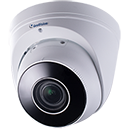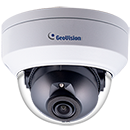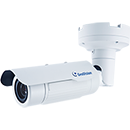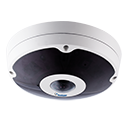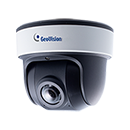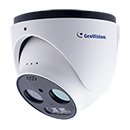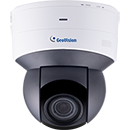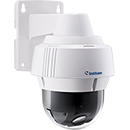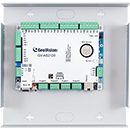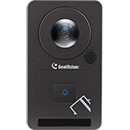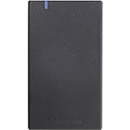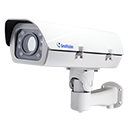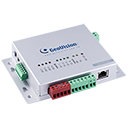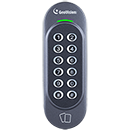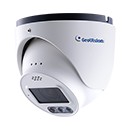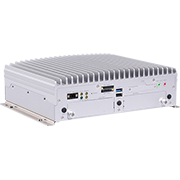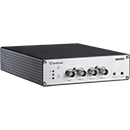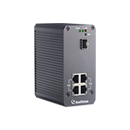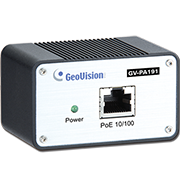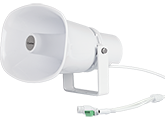
We’ve all heard at least one horror story about a family returning home from a long vacation only to find that their house has been broken into or a pipe has burst in their absence. Problems like these can cost hundreds of dollars to fix and are guaranteed to cause a lot of stress. Fortunately, there are plenty of things you can do to help prevent security breaches while you’re off on a family adventure.
We’ve compiled the following tips to help you prep your house for safety before you go out of town and truly relax while you’re away. Some of them require a little investment and forethought, but taking these steps now will save you from major headaches down the road.
1. Get a professionally monitored home security system
Your first line of defense against burglary is a home security system that includes door and window sensors.
Some systems allow you to self-monitor, but especially if you’re going out of the country or somewhere with unreliable data network coverage, alerts on your phone won’t do you much good.
With a monitored home security system, the alarm company calls the authorities for you when there’s a breach.
2. Make sure that system includes environmental sensors
Most modern home security systems have the option to monitor not only when someone enters your property but against damaging environmental factors as well.
Flood sensors detect changes in moisture levels in the air, which can indicate broken pipes or appliances.
Many security systems now also include or at least sync with smoke detectors and carbon monoxide detectors to raise the alarm when there’s a fire or noxious fumes.
3. Install outdoor security lights
When looking for a way inside, burglars are more likely to go for areas that are dark and hidden from the neighbors’ view.
You can illuminate these hiding spots by installing outdoor security lights in burglary-prone areas such as the back door or sides of the house.
Most models are either motion activated or will only come on at night, so you don’t have to worry about them wasting a lot of energy.
4. Add a smart lock to your door
A smart door lock lets you unlock your door remotely from your smartphone and grant temporary access with expiring codes.
If you have a neighbor checking in on the house or a pet sitter coming to take care of the dogs, you can keep track of exactly who goes in and out of your house and terminate access once you’re home again.
No more trying to keep track of who has your spare keys because you have full control over who does and doesn’t have access at any given time.
5. Remove spare keys you may have stashed under the doormat
Keeping spare keys stashed outside your house is never a great idea anyway (get a smart door lock instead), but if you’re going out of town, now is the time to collect them all. Your hiding spots aren’t as clever as you think.
6. Lock everything
This is a step that’s easy to forget. Make sure all doors and windows are shut and locked. Close most blinds and curtains—if you’re putting timers on lights to simulate human presence, make sure that light can get through to the street.
7. Install a video doorbell
A video doorbell allows you to answer your front door from anywhere.
Each time someone rings the doorbell, you’ll get an alert on your phone so you can see and speak to the visitor in real time.
If you’re out of cell service on the beach or hacking through the jungle, you can still access a log of video clips later.
Some models also have motion detection capabilities, so you’ll still get an alert even if the person doesn’t actually ring the bell.
They’re also handy for catching package thieves and spreading the word around the neighborhood.
8. Check batteries in all home security devices
This one’s pretty simple, but it often goes overlooked.
Regularly check all your security and safety devices—motion detectors, cameras, and smoke detectors—to make sure the batteries won’t fail while you’re gone.
Even if something is hardwired, it may have a backup battery in case of power outages. Opt for high-quality batteries over budget batteries, as you’re likely to get more life out of them.
9. Unplug nonessential electronics
Unplugging nonessential electronics—TVs, computers, coffee makers, fans, lamps etc.—will both reduce the risk of fire and save you money.
The power used by plugged-in electronics while they’re not in use, sometimes called phantom or standby power, accounts for 5–10% of residential energy use and costs each household around $100 each year.
Unplugging devices also protects them against electrical surges, which can short out expensive equipment or cause fires.
Electrical fires account for 13% of total residential fires in the United States,1 and if you’re away from home, there’s nothing you can do to stop these fires when something malfunctions.
10. Invest in security cameras
A handful of well-placed security cameras both inside and outside can mean the difference between catching a perpetrator or not.
Get something which is motion activated and will send alerts and video clips to your smartphone so you can take immediate action.
These kind of cameras allow you to remotely drop in on your cameras in real time and live stream whatever’s going on at your house.
11. Get valuables out of sight
This is a good rule of thumb any time you leave the house, but it’s especially important when you’ll be gone for several days at a time.
Close the blinds or curtains in rooms with large electronics, such as TVs.
Put gaming consoles and DVD players in inconspicuous boxes in the closet and make sure all handheld devices, credit cards, cash, or jewelry aren’t easy to find—make use of a safe if you have one. Firearms should already be in a gun safe anyway.
12. Simulate a human presence
To make it look like someone’s home, create a smart lighting system that you can preprogram to turn on at varied times while you’re away.
Turning on a radio is another classic technique, and if you want to get fancy, connect the radio to an appliance timer and coordinate it with the lights.
13. Ask a trusted friend or neighbor to check in periodically
Have someone stop by from time to time to check for signs of attempted entry, burst pipes, or any other potential problems.
Ask them to park in the driveway, adjust some blinds, or maybe move some patio furniture so it’s clear from the outside that there’s someone around.
Adapted from Asecurelife
